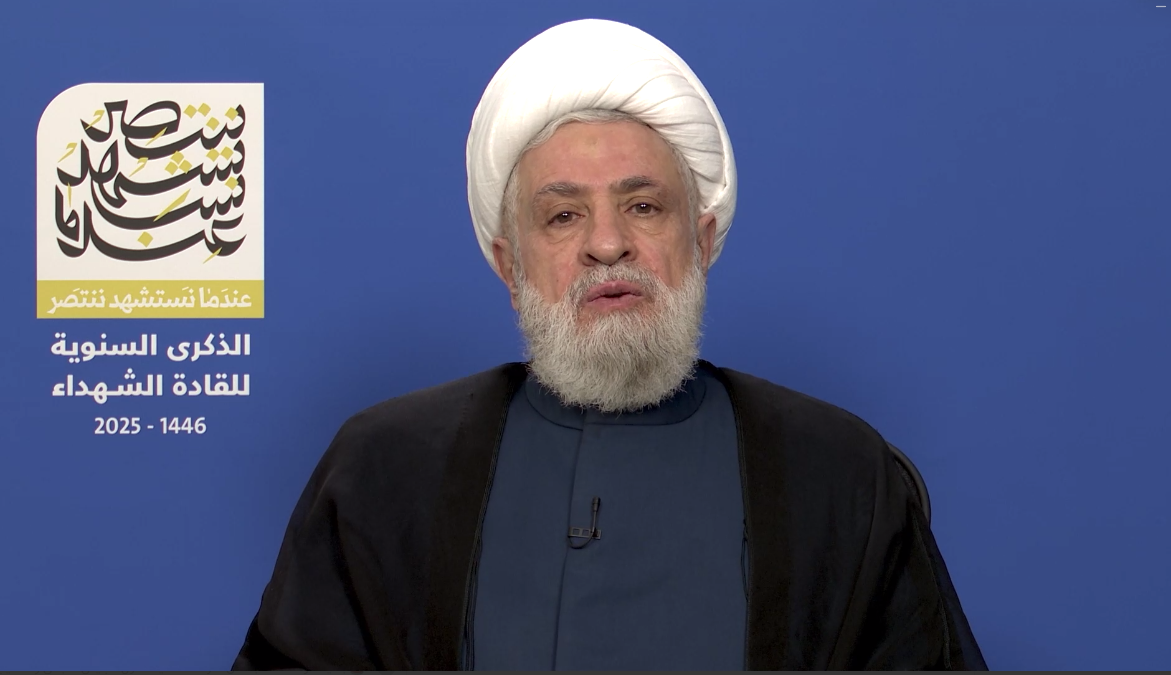
In a ritual now well mastered, Hezbollah’s Secretary General Naim Qassem placed his speech under two political banners, one rather reduced, regional, the other more elaborate, local.
With regard to internal political developments, Qassem played the cards of “apparent good intention” and “innocence.” “We have endeavored to contribute to the regulation of the institutions: everyone can attest that it was the Shiite duo that successfully led the election of President Joseph Aoun, and so we have been a fundamental stakeholder in the consecration of the national entente,” he asserted.
In the same conciliatory tone, Qassem described the Shiite duo, in this case Hezbollah, as “facilitators” in the formation of the government and “contributors to the country's take-off.”
Referring to the ministerial declaration, which will no longer provide “legitimate cover” for Hezbollah's weapons by using the traditional slogan “people, arms and resistance,” now revoked from official literature, Qassem had no hesitation in declaring: “The Lebanese people have the right to confront the Israeli enemy. It is an established right.”
As for the case of the Iranian plane banned from landing at Beirut's Rafic Hariri International Airport, Qassem discredited the “protection of civilians” reason put forward by Prime Minister Nawaf Salam, believing that it was in fact the execution of an Israeli order. “Let the plane land and let's see what Israel does,” he claimed. “Are we employees of Israel? We are carrying out the occupier's demands. I ask the government to reconsider this decision in a way that strengthens our sovereignty.”
Qassem denigrated the firing of tear gas canisters against demonstrators on the airport road. He considered that “there was no need for us to get involved between the Army and the people.”
He also condemned the attack on the United Nations Interim Force (UNIFIL).
Qassem then established himself as the guide of the State. He identified the guidelines to be applied by those in charge: bring the corrupters to trial; work by all means to force Israel to withdraw completely, otherwise “everyone knows how to deal with the occupation,” alluding to Hezbollah's eventual recourse to arms.
Another instruction to the State was to begin reconstruction. Qassem had no hesitation in expressing himself clearly on this subject: “The State's duty is to work towards reconstruction. We are ready to cooperate in this operation, which is the responsibility of the State.”
Still dressed as an advisor to the Republic, he “proposed” that the government use competitive examinations to select competent administrative officials, thus putting an end to the distribution of quotas and clientelism.
Addressing US President Donald Trump's “very dangerous” stance on the Palestinian cause, Qassem described it as “political genocide” in line with Israel's flawed attempt to eradicate the Palestinian people.
Qassem blamed Arab countries for remaining silent in the face of the “genocide” perpetrated against the Palestinian people, when they could exert pressure and resort to the boycott policy to “change the equation.” “We firmly reject any displacement of Palestinians to Egypt, Jordan, Saudi Arabia or any other country. We also reject any move to Lebanon,” affirmed Qassem.
Returning to the occasion of this speech, the commemoration of the memory of Hezbollah's martyred leaders, Hezbollah's Secretary General invited a large popular turnout in view of the “exceptional character” of Hezbollah's two former Secretaries General, Sayyed Hassan Nasrallah and Sayyed Hashem Safieddine, but above all as a public declaration of loyalty to a path and a way of life.



Comments